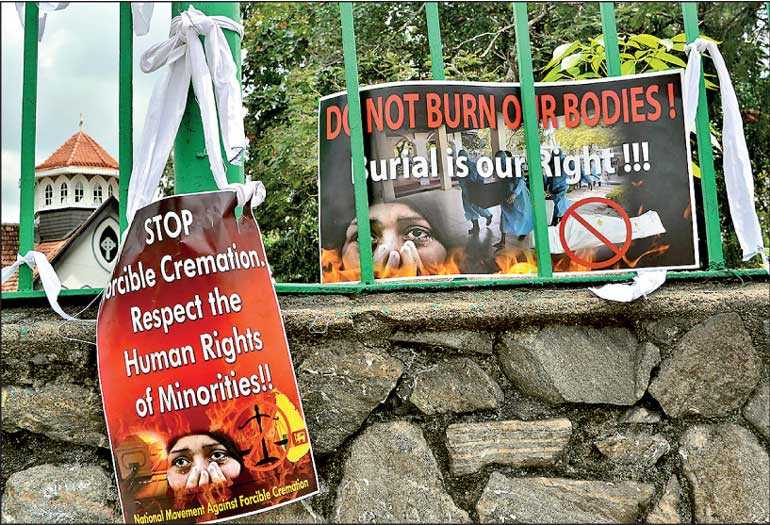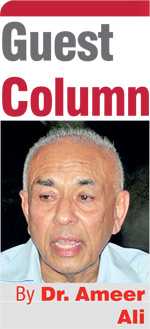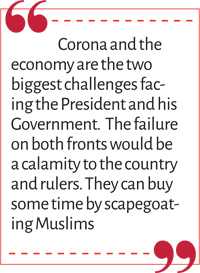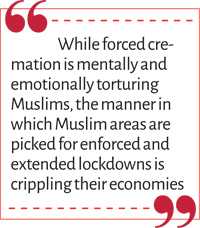Wednesday Feb 18, 2026
Wednesday Feb 18, 2026
Saturday, 9 January 2021 00:10 - - {{hitsCtrl.values.hits}}

The cremation/burial controversy is a micro item of a macro agenda in the hands of the ruling power cartel to reduce the two minorities to second class status. Only a broad coalition of democratic forces including the discontented Sinhala Buddhists and rest of the country could bring back peace and prosperity to this blessed nation – Pic by Shehan Gunasekara
 A fourteen-and-a-half century-old Muslim religious and human right to bury the Muslim dead has turned into an intractable issue, because of corona, and has invited unwanted attention from international bodies and human rights circles, which are condemning the Sri Lankan Government’s intransigence on cremating all COVID-19 infected bodies without exception.
A fourteen-and-a-half century-old Muslim religious and human right to bury the Muslim dead has turned into an intractable issue, because of corona, and has invited unwanted attention from international bodies and human rights circles, which are condemning the Sri Lankan Government’s intransigence on cremating all COVID-19 infected bodies without exception.
What the protestors abroad fail to understand is the political reality inside the country, which requires Muslim dissatisfaction or the ‘Muslim Problem’ to continue burning so that the Government could deflect the popular discontent growing against it. Its mismanagement of the second wave of the pandemic and its incoherent and impulsive set of remedies to revive the pandemic hit economy are providing enough ammunition to its critiques. Therefore, the cremation issue is a blessing in disguise to a beleaguered Government.
To satisfy international public opinion and those who protest at home, President Gotabaya appointed a committee of experts to report on the matter. In fact, there were two committees, a Technical Committee on the Disposal of COVID-19 Infected Bodies, and an Expert Panel. The Government adopted the age-old administrative trick to appoint a committee, when it did not want to take action.
Fortunately for the Government and supremacists the two committees came with two different conclusions. The first insisted that cremation would be the safest mode of disposal while the second recommended both cremation and or burial, latter under strict conditions. The final decision is now in the hands of the Health Minister, who herself believes in blessed water as a possible weapon for eradicating the virus. 
Even before the reports were released politicians on the Government side were arguing that it was not for the experts to decide on the matter but the Government that was elected with a two-third majority. This casual dismissal of advice from experts by corrupt politicians show that the President and his Prime Minister are actually prisoners in the hands of a power cartel of Sinhala Buddhist supremacists, whose ultimate objective is to transform Sri Lanka into a monolithic Theravada Buddhist state in which the principle of One-Country-One-Law would prevail. What is good for the goose in the cartel’s view must be good for gander. If Buddhists could cremate their dead why not Muslims and Christians? In short, to these villains of Gautama a plural democracy is anathema.
Gotabaya was elected as President and empowered as an autocrat overwhelmingly by Sinhala Buddhists in order to protect and promote Buddhist interests primarily. Consequently, each one of his actions so far has demonstrated that he is acting as the president for Sinhala Buddhists only and not for all communities, as he declared initially. The issue of cremating COVID-19 infected Muslim bodies should therefore be viewed from this angle.
There are of course saner minds from the Sangha, Sinhala Buddhist and other communities who are appealing to the President to allow burial as an option. So far, their appeals have fallen on deaf ears, because the Government, as pointed out at the beginning, also hopes to reap political benefit in remaining intransigent.
While forced cremation is mentally and emotionally torturing Muslims, the manner in which Muslim areas are picked for enforced and extended lockdowns is crippling their economies.
For example, the President recently appointed 25 Army men as District Coordinating Officers to control the virus infection. The first thing the appointee for Batticaloa did was to lock down Kattankudy initially for five days and now for another 15 days. Kattankudy with adjoining Poonochchimunai is the most thickly populated Muslim enclave in the country, with around 50,000 souls packed into a land area of roughly 3.5 km2.
These Muslims are mostly businessmen, and Kattankudy has one of the busiest bazaars in the district with additional shops belonging to these men in Batticaloa, 5.2 km away to the north. Strangely enough, Kattankudy lockdowns seem to coincide with festival seasons such as the Tamil and Sinhalese New Year in April 2019, and Pongal season in January this year, when these merchants expect to do roaring business. Is there a hidden agenda here to prevent customers from flocking to Muslim shops in Kattankudy and traders from that town opening shops in Batticaloa?
Since 2009, Buddhist supremacists had been campaigning amongst Sinhala Buddhists to boycott Muslim businesses. In one instance in 2018, at Padiyathalawa along Batticaloa-Badulla road, a Buddhist monk chased out Sinhalese customers buying from a Muslim textile shop, and the monk entered that premise and ordered the owner to close his business and return to his native town, Kattankudy.
In another instance, a district council in a Sinhalese area refused to issue license to Muslim traders to open shops in that area. It appears that the President’s vision of prosperity and splendour would be achieved at least partly through killing competition from Muslims. Impoverishment of Muslims appears to be part of the overall agenda of reigning Islamophobia in the country.
Corona and the economy are the two biggest challenges facing the President and his Government. The failure on both fronts would be a calamity to the country and rulers. They can buy some time by scapegoating Muslims. Pro-regime social media are still propagating the view that it was Muslims who brought the virus to the country in the first place, when some of them returned after their missionary work in India.
Recently, inquiries into two incidents in Mawanella, the theft of gelignite from a quarry and the stoning of Buddha’s glass enclosure have dismissed Muslim involvement, although not entirely however. Because, in a strange twist, DIG Ajit Rohana had said that there was no evidence to prove that extremists were not involved in that theft. What did he mean? Did he want to keep the suspicion on Muslims alive?
In fact, it was US Foreign Secretary Donald Rumsfeld who said, when UN appointed investigators failed to discover any nuclear weapon in Saddam’s Iraq, “absence of evidence is no evidence of absence”, and kept the option for war open. Similarly, DIG Rohana, seems to keep the option for an ethnic flare up open in Mawanella.
The cremation/burial controversy is a micro item of a macro agenda in the hands of the ruling power cartel to reduce the two minorities to second class status. Only a broad coalition of democratic forces including the discontented Sinhala Buddhists and rest of the country could bring back peace and prosperity to this blessed nation.
From J.R. Jayewardene to Mahinda Rajapaksa, all presidents wanted to transform Sri Lanka into another Singapore. The current president seems to have his own model of a Valhalla. But, none of them seem to understand that Singapore was built as an economic powerhouse not on capital and technology alone but more importantly on the unity of its citizens, irrespective of their ethnic, religious and linguistic differences. Will Gautama’s villains ever learn this lesson?
(The writer is attached to the School of Business and Governance, Murdoch University, Western Australia.)